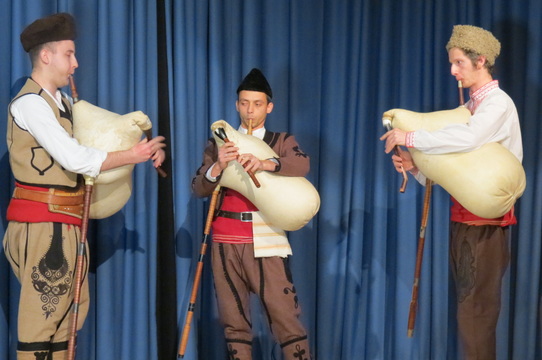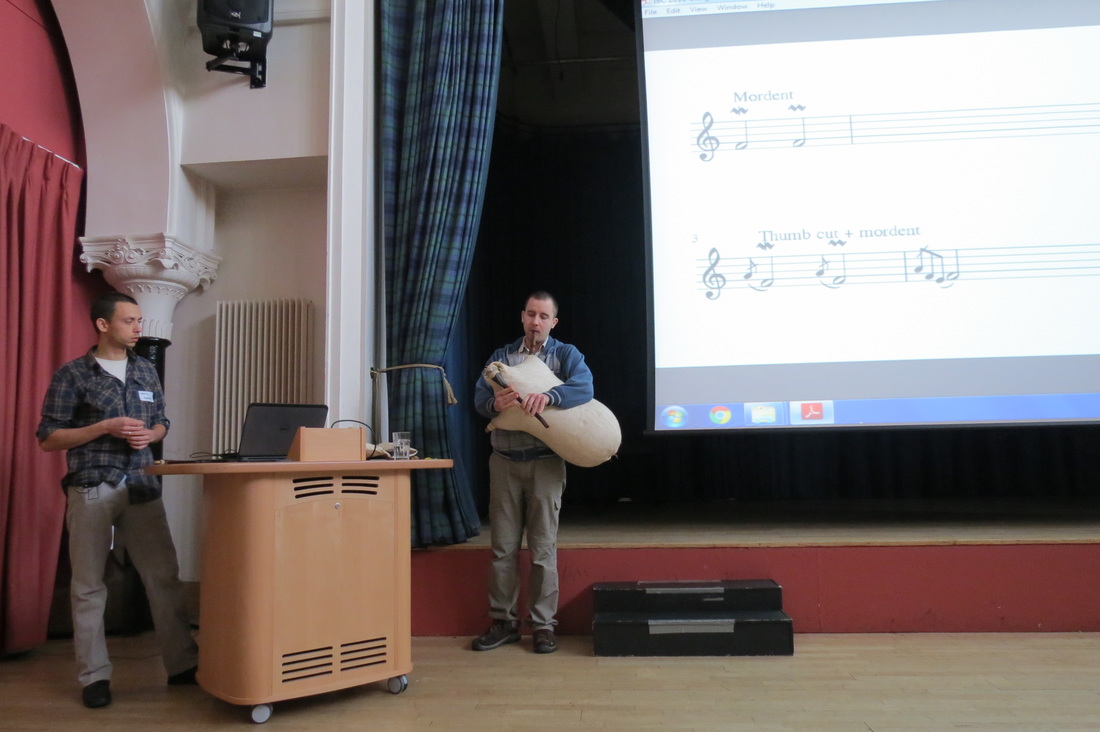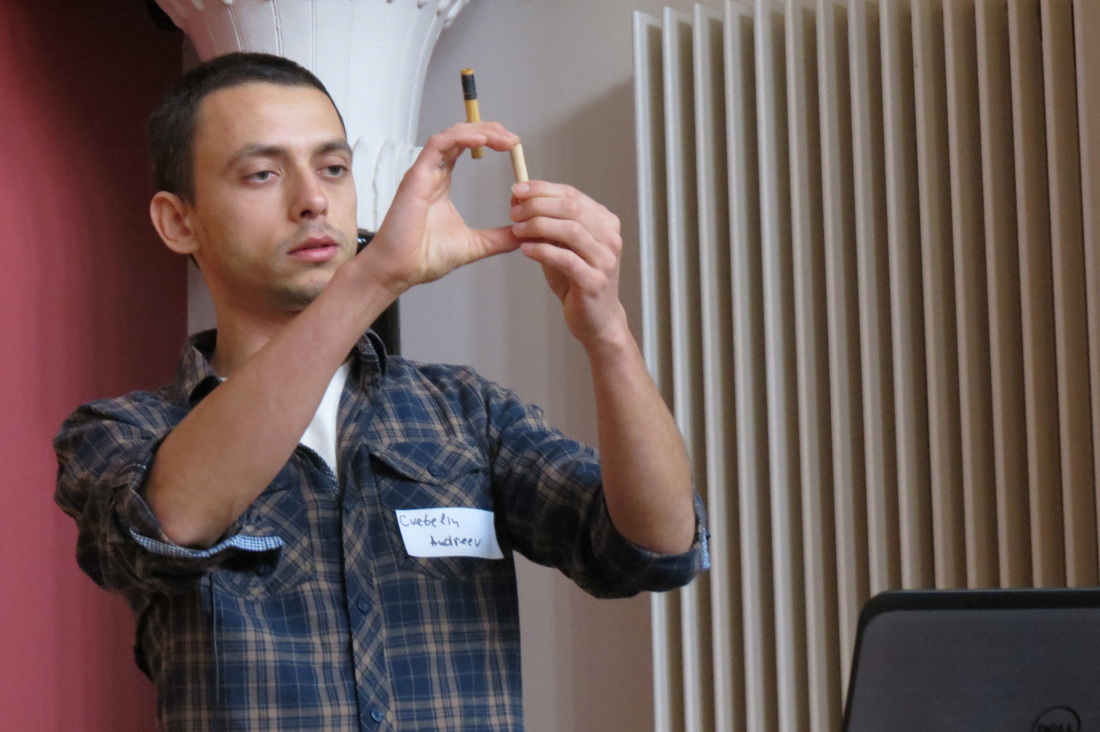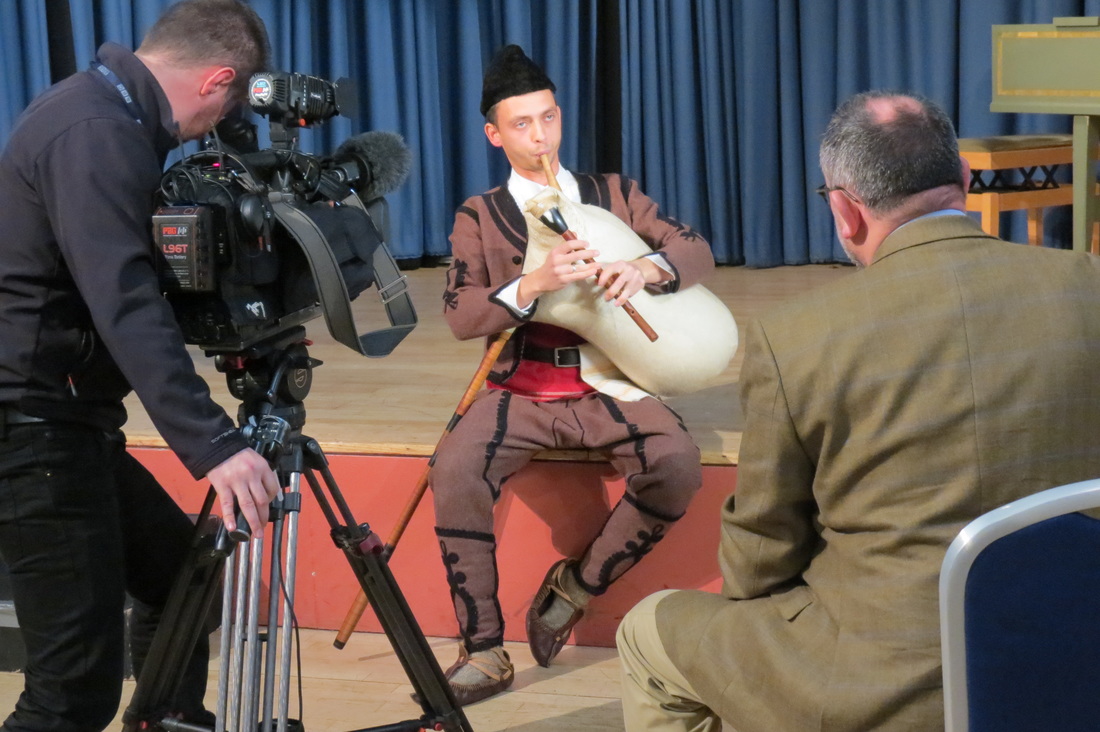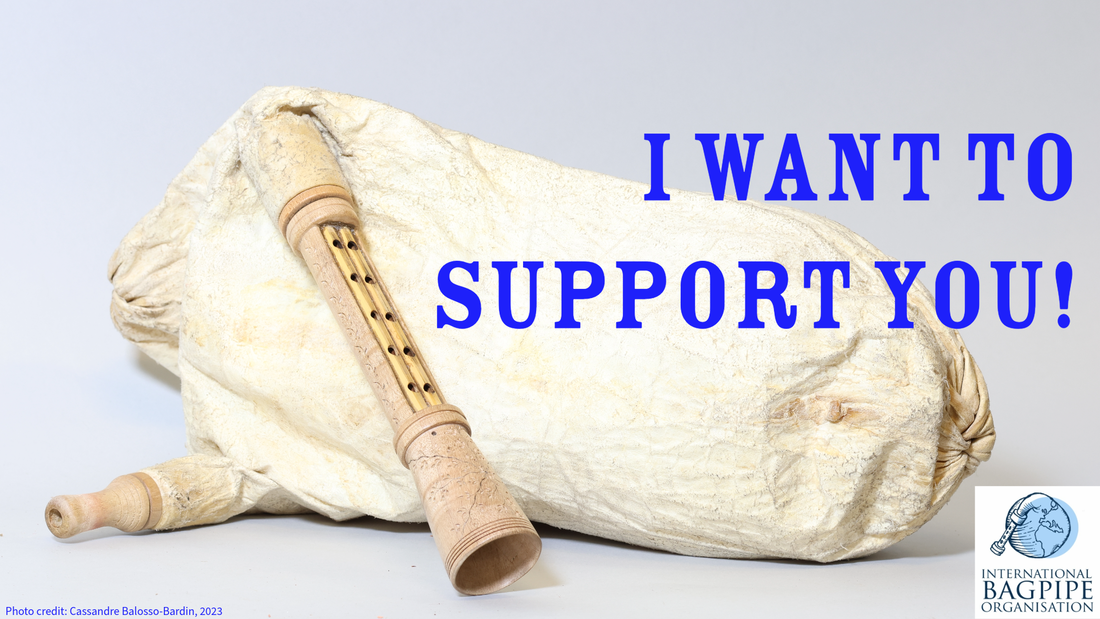Kaynak Pipers Band performed at IBC 2016 and just got invited to play at the prestigious Richmond Folk Music festival and Chicago Folk Music festival. For those who were absent, Kaynak Pipers Band is a Bulgarian group performing traditional music from the Rhodope Mountains. The soul of their performance is the sonorous and mild sound of the Rhodopian kaba gaida, the big Bulgarian bagpipe (as opposed to the djura gaida, smaller and higher pitched). Their bagpipes are made out of wood, horn and leather and their sound evokes mythological images from the past.
Here is an interview with Cvetelin Andreev, manager, piper and kaba gaida trainer about their past and upcoming projects.
Here is an interview with Cvetelin Andreev, manager, piper and kaba gaida trainer about their past and upcoming projects.
Cvetelin, you are the founder of the band. Tell us more about how it started.
Well, It all began in 2005 in "Dobri Chintulov" Community Centre, Sofia, Bulgaria where I met Yanko Marangozov, then we were just beginners. Kostadin Gerdjikov and Hristo Gerdjikov, who were more advanced, came later. We became friends quickly. Then Petar Yordanov – Bunny from "Oratnitza" and Todora Vasileva joined us. Afterwards we started to develop educational activities. We were then called "Gaydunitsa" (the chanter of the gaida). Then we renamed ourselves to "Kaynak". "Kaynak" comes from Turkish and means a “source”. In the Rhodope Mountains the phrase "this is his kaynak" is sometimes used when a piper plays special, masterly and distinctive tunes. The band aims to promote the Rhodope bagpipe among children and adults in Bulgaria and
abroad, as well as to support educational activities.
Well, It all began in 2005 in "Dobri Chintulov" Community Centre, Sofia, Bulgaria where I met Yanko Marangozov, then we were just beginners. Kostadin Gerdjikov and Hristo Gerdjikov, who were more advanced, came later. We became friends quickly. Then Petar Yordanov – Bunny from "Oratnitza" and Todora Vasileva joined us. Afterwards we started to develop educational activities. We were then called "Gaydunitsa" (the chanter of the gaida). Then we renamed ourselves to "Kaynak". "Kaynak" comes from Turkish and means a “source”. In the Rhodope Mountains the phrase "this is his kaynak" is sometimes used when a piper plays special, masterly and distinctive tunes. The band aims to promote the Rhodope bagpipe among children and adults in Bulgaria and
abroad, as well as to support educational activities.
What is so special about the gaida for you?
A few things: first, it has managed to preserve its authentic form for perhaps thousands of years. By form I mean the way it is made, maintained and played. This we believe is part of its magic – it manages to bring up to present days sounds and tunes from forgotten times, sounds that we all know deep in our soul and that give you goosebumps. Second, the gaida is not any a musical instrument. It gathers people. And we enjoy being with people, sharing thoughts and ideas.
A few things: first, it has managed to preserve its authentic form for perhaps thousands of years. By form I mean the way it is made, maintained and played. This we believe is part of its magic – it manages to bring up to present days sounds and tunes from forgotten times, sounds that we all know deep in our soul and that give you goosebumps. Second, the gaida is not any a musical instrument. It gathers people. And we enjoy being with people, sharing thoughts and ideas.
You took part in the current edition of the International Bagpipe Conference. How do you feel about it?
First, a huge Thank you to the organisers of the conference. They did the impossible to get us on board. We took part in the opening concert and presented at the conference itself.
For the opening concert we played a gaida suite specially composed for the event. It was twenty five minutes long and represented most of the diversity in the Rhodopean folklore. It started with an unmeasured song, continued with fast tunes for dancing in 2/4 rhythm and irregular rhythms - 9/8 (2+2+2+3), 7/8 (3+2+2), 5/8 (2+3) and ended with a fast rachenitsa dance in 7/8 (2+2+3).
The presentation we made for the conference included topics of interest for makers, musicians and ethnomusicologists. It covered the specific ways of making the kaba gaida and we demonstrated how we make the reeds from elder tree. Kaba gaida music is rich in ornaments and reproducing them is quite interesting for musicians. We managed to notate the basic ornaments and represented our 4 level training system. For the ethnomusicologists, we talked about the diversity of performance styles and regions as well as history of the bagpipe and important events. We covered some trending projects related to our music including ours - KabaGaida.Com for online training, workshops and educational concerts.
At the IBC's open mic evening, we invited a special guest to play with us. A Scottish piper from Edinburgh, who lived in Bulgaria for couple of years and knows many Rhodopean songs and dances, joined us while singing and dancing. We were very glad to know that our culture is notable in Scotland from before the conference.
We were also very happy that were interviewed on BBC Scotland news as part of a feature on the conference and its concert (pictured below).
First, a huge Thank you to the organisers of the conference. They did the impossible to get us on board. We took part in the opening concert and presented at the conference itself.
For the opening concert we played a gaida suite specially composed for the event. It was twenty five minutes long and represented most of the diversity in the Rhodopean folklore. It started with an unmeasured song, continued with fast tunes for dancing in 2/4 rhythm and irregular rhythms - 9/8 (2+2+2+3), 7/8 (3+2+2), 5/8 (2+3) and ended with a fast rachenitsa dance in 7/8 (2+2+3).
The presentation we made for the conference included topics of interest for makers, musicians and ethnomusicologists. It covered the specific ways of making the kaba gaida and we demonstrated how we make the reeds from elder tree. Kaba gaida music is rich in ornaments and reproducing them is quite interesting for musicians. We managed to notate the basic ornaments and represented our 4 level training system. For the ethnomusicologists, we talked about the diversity of performance styles and regions as well as history of the bagpipe and important events. We covered some trending projects related to our music including ours - KabaGaida.Com for online training, workshops and educational concerts.
At the IBC's open mic evening, we invited a special guest to play with us. A Scottish piper from Edinburgh, who lived in Bulgaria for couple of years and knows many Rhodopean songs and dances, joined us while singing and dancing. We were very glad to know that our culture is notable in Scotland from before the conference.
We were also very happy that were interviewed on BBC Scotland news as part of a feature on the conference and its concert (pictured below).
What happens when you go back to Bulgaria?
We will continue to work on our continuing project KabaGaida.Com to help people learn the kaba gaida and feel it’s magic, music and traditions. We are now starting to record more training videos and notate new songs that people can use for free.
We are happy to announce that we were invited to two of the largest US festivals for world and folk music this fall - Chicago World Music Festival and Richmond Folk Festival. Our tour passes through New York, Boston, Baltimore and Washington. Between our performances we will organize music workshops for children within the Bulgarian communities and hopefully present our instruments at different university music departments.
We wish them the best of luck!
We will continue to work on our continuing project KabaGaida.Com to help people learn the kaba gaida and feel it’s magic, music and traditions. We are now starting to record more training videos and notate new songs that people can use for free.
We are happy to announce that we were invited to two of the largest US festivals for world and folk music this fall - Chicago World Music Festival and Richmond Folk Festival. Our tour passes through New York, Boston, Baltimore and Washington. Between our performances we will organize music workshops for children within the Bulgarian communities and hopefully present our instruments at different university music departments.
We wish them the best of luck!

